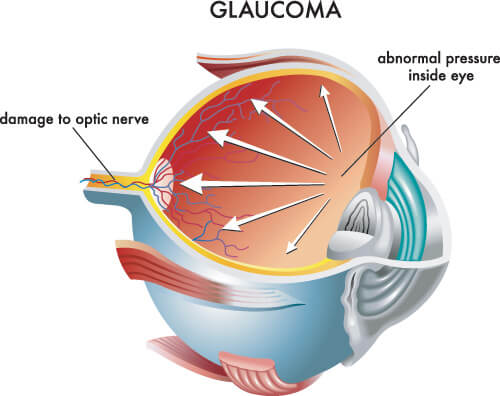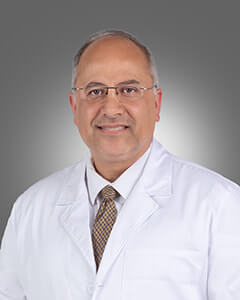What is Glaucoma?

Glaucoma is one of the leading causes of blindness in people over the age of 40. It is a group of diseases that leads to vision loss. Vision loss occurs when the optic nerve is damaged by pressure inside the eye. The higher eye pressure compresses the optic nerve causing damage. This damage can be seen by your eye doctor as a central depression in the optic nerve called the “optic cup”. It represents the area where optic nerve fibers have been damaged or lost. As the nerve fibers are lost, so too is the vision. This process is referred to as glaucoma.
The eye’s pressure is maintained by a delicate balance between fluid production and fluid outflow. The fluid leaves the eye through drainage channels in the “angle” of the eye where the iris meets the edge of the cornea; these channels are called the trabecular meshwork and filter eye fluid to small blood vessels leading into the systemic circulation.
High eye pressure is not related to high blood pressure, but glaucoma is found along with other vascular diseases like hypertension and diabetes. It can also occur after a severe eye infection or trauma. Glaucoma is not a contagious disease but can be hereditary.
What causes Glaucoma?
Glaucoma occurs when the outflow of the fluid that circulates through eye gets backed up due to a blockage of the drainage channel. Pressure then builds within the eye and this pressure damages the optic nerve. causing vision loss.
What are the beginning signs of Glaucoma?
Unfortunately there are no signs that indicate to you that glaucoma may be developing. This is why it is known as the silent thief of sight.
How do I find out if I have Glaucoma?
Maintaining your regularly scheduled eye exams and having the proper testing done will allow our doctors to monitor your vision and detect the onset of glaucoma.
What are my options?
Once glaucoma has been diagnosed there are several options you have for treatment. Glaucoma treatment options include eye-drops, laser or surgery. These options will vary depending on the type of glaucoma you have and the severity of the glaucoma.
Glaucoma continues to be the leading cause of preventable blindness in the United States. Treatment with drops, lasers, or surgery can maintain vision in the vast majority of patients. With glaucoma, if treated early and effectively, patients typically maintain useful vision in one or both eyes. It is important to remember that frequent follow-up is needed and paying close attention to your eye doctor’s recommendations will help preserve your vision. Should you have any further questions or concerns, do not hesitate to talk to your eye doctor.
Stay proactive in your eye health. Request an eye exam today with the doctors at Eye Specialists of Mid-Florida. We are proud to be of service to the local communities and surrounding areas of our locations in Auburndale, Clermont, Haines City, Lakeland (2 locations), Lake Wales, Sebring, and Winter Haven.



